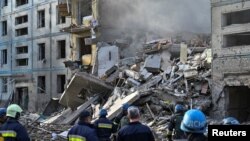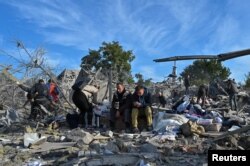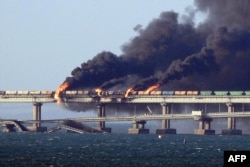For full coverage of the crisis in Ukraine, visit Flashpoint Ukraine.
The latest developments in Russia’s war on Ukraine. All times EDT.
11 p.m.: French President Emmanuel Macron voiced his support for imprisoned Belarusian human rights activist and 2022 Nobel Peace Prize laureate Ales Beliatski during a phone call on Sunday with Beliatski’s wife, Natalia Pinchuk, Agence France-Presse reported.
"He wanted to show his support for the (activist) and his relatives" while Ales Beliatski has been imprisoned again since July 2021, said the Elysée.
The 2022 Nobel Peace Prize was jointly awarded on Friday to Ales Beliatski, the Russian NGO Memorial — hit by a dissolution order — and the Ukrainian Center for Civil Liberties, which works to document "war crimes Russians" in the ongoing conflict in Ukraine.
Macron then welcomed the awarding of the prize to "unwavering defenders of human rights in Europe."
10 p.m.: People trying to leave Crimea are spending hours in kilometers-long (miles) traffic jams in the hope of reaching the Kerch bridge, linking the Russia-annexed peninsula with the mainland, The Associated Press reported.
"They say that you can spend almost twenty-four hours in this traffic jam," one driver waiting his turn told the AP on Sunday.
Car traffic has resumed along both road sections of the Kerch Bridge, Russia's deputy prime minister said on Sunday.
Marat Khusnullin, who also heads a government commission investigating the blast which tore through the bridge on Saturday, said in a Telegram post that previously, only one section was open to alternating traffic.
Khusnullin added that authorities continued their investigation of the damage.
9:27 p.m.: Germany’s foreign minister has called on the European Union to slap new sanctions on Iran for what she described as Tehran’s brutal repression against anti-government protesters in several Iranian cities, Radio Free Europe/Radio Liberty reported on Sunday.
Annalena Baerbock was quoted on October 9 as telling the Bild Am Sonntag newspaper that “those who beat up women and girls on the street, carry off people who want nothing other than to live freely, arrest them arbitrarily, and sentence them to death stand on the wrong side of history.”
Baerbock said, without citing specific individuals, that “we will ensure that the EU imposes entry bans on those responsible for this brutal repression and freezes their assets in the EU."
8:44 p.m.: Ukrainian Teams Clear Mines Around Liberated City of Lyman: Ukrainian authorities are working quickly to find, identify, and, when possible, remove mines and unexploded ordnance from the newly liberated area of Lyman as the town's residents struggle to get back to normal after being occupied by Russian forces. Radio Free Europe/Radio Liberty has a photo gallery.
7:55 p.m.:
7:10 p.m.: A Ukrainian mortar battery provides cover for their infantry on the front line in eastern Ukraine. They fire dozens of shells per day, including some captured from Russian forces. They aim at targets up to 7 kilometers away, the maximum range, as longer-range Russian artillery hits back at them. Radio Free Europe/Radio Liberty has the story.
6:18 p.m.: German Chancellor Olaf Scholz and U.S. President Joe Biden spoke by phone on Sunday and agreed the Kremlin's latest nuclear threats were "irresponsible" and its partial mobilization "a serious mistake," according to a German government statement, which Reuters reported.
The nearly one-hour telephone call was focused on preparations for the upcoming Group of Seven and Group of 20 meetings that will address Russia's invasion of Ukraine and the consequences, the statement said.
The two leaders agreed never to accept Russia's annexation of Ukrainian territory, calling it a further escalation, the statement said.
They agreed Russia's partial mobilization showed the "bitter price" Russians were having to pay for the miscalculations of President Vladimir Putin.
"They criticized the latest nuclear threats of Moscow as irresponsible and agreed such a step would have exceptionally serious consequences for Russia," the statement said.
On the topic of the attacks on the Nord Stream pipelines, the two leaders agreed the sabotage of critical infrastructure would be dealt with decisively, it said.
5:43 p.m.:
5:02 p.m.: An external power line to Ukraine's Zaporizhzhia nuclear power plant — the biggest in Europe — was repaired on Sunday after shelling disconnected the facility from the grid and forced it to resort to emergency diesel generators, the U.N. nuclear watchdog said, according to The Associated Press.
The International Atomic Energy Agency said the 750-kilovolt line was reconnected to the plant on Sunday evening following repair work by Ukrainian engineers. That enabled the plant to start switching off the generators that had kicked in to provide it with power after the line — its last connection to the grid — was cut early Saturday.
IAEA Director-General Rafael Grossi tweeted that the reconnection was “a temporary relief in a still-untenable situation.”
4:15 p.m.: In his nightly video address, Ukrainian President Volodymyr Zelenskyy said, "Terrorism is a crime that must be punished. Terrorism at the state level is one of the most heinous international crimes, which threatens not just someone in the world, but the entire international community.
"If terror goes unpunished, if the terrorist succeeds in intimidation so much that someone in the world is willing to simply turn a blind eye to terror, then that will be a loss - a loss of freedom, a loss of humanity and a loss of democracy. This is exactly what Russia longs for. This is why it needs all this terror - from missile strikes to global crises provoked by a terrorist state," Zelenskyy said.
3:30 p.m. A regional election in Lower Saxony delivered a mixed message for German Chancellor Olaf Scholz's national ruling coalition on Sunday, with his Social Democrats scoring a clear win but the Free Democrats barely making it into parliament.
While the result signaled support for Scholz's Social Democrats (SPD), some experts said the drubbing of its federal coalition partner risked destabilizing Scholz's administration at a critical time as Berlin strives to avert energy shortages and further escalation of the war in Ukraine.
The other clear winner in Lower Saxony was the far-right Alternative for Germany (AfD), reflecting a broader upsurge in support for the party across the country amid frustrations over the cost-of-living crisis in Europe's largest economy, Reuters reported.
2:55 p.m.: German Chancellor Olaf Scholz and U.S. President Joe Biden spoke by phone on Sunday and agreed the Kremlin's latest nuclear threats were "irresponsible" and its partial mobilization "a serious mistake," according to a German government statement.
According to Reuters, the nearly one-hour telephone call was focused on preparations for the upcoming Group of Seven and Group of 20 meetings that will address Russia’s invasion of Ukraine and the consequences, the statement said.
The two leaders agreed never to accept Russia's annexation of Ukrainian territory, calling it a further escalation, the statement said.
They agreed Russia's partial mobilization showed the "bitter price" Russians were having to pay for the miscalculations of President Vladimir Putin.
"They criticized the latest nuclear threats of Moscow as irresponsible and agreed such a step would have exceptionally serious consequences for Russia," the statement said.
On the topic of the attacks on the Nord Stream pipelines, the statement said the two leaders agreed the sabotage of critical infrastructure would be dealt with decisively.
2:25 p.m.: Bill Richardson, the former New Mexico governor and ambassador to the United Nations, said on Sunday that he is “cautiously optimistic” that a deal will be reached to release Brittney Grinerand Paul Whelan, two Americans imprisoned in Russia.
Mr. Richardson — who has been unofficially negotiating with Russian officials as a private citizen — told CNN’s “State of the Union” that a deal could be feasible by the end of the year, saying that Russia appeared to be willing to move forward on an agreement to exchange Ms. Griner, a W.N.B.A. all-star, and Mr. Whelan, a former Marine, for two Russian prisoners held by the United States.
“I got the sense that the Russian officials that I met with, that I’ve known over the years, are ready to talk,” Mr. Richardson said.
Ms. Griner, who was arrested just before Russia invaded Ukraine in February, was sentenced to nine years in a Russian penal colony after pleading guilty to a drug possession charge. Mr. Whelan was sentenced to 16 years on espionage charges in 2020.
2:10 p.m.: According to Reuters, Kremlin leader Vladimir Putin said, Sunday, that the explosion on a key bridge linking Crimea and the Russian mainland was a terrorist act planned by the Ukrainian special services.
"There is no doubt. This is an act of terrorism aimed at destroying critically important civilian infrastructure," Putin said in a video on the Kremlin's Telegram channel. "This was devised, carried out and ordered by the Ukrainian special services."
Putin was meeting Alexander Bastrykin, the head of Russia's Investigative Committee, who was presenting findings of an inquiry into Saturday's explosion and fire on the bridge.
2 p.m.: At NBC’s US show Today, Sunday, Retired Admiral James Stavridis discussed the threat of Vladimir Putin using nuclear weapons. Stavridis said that though “we are closer to the use of a nuclear weapon,” it is far more likely that in such a scenario, there will be a smaller nuclear device by Putin. Stavridis said, “the West is prepared for this. “We [the US] have many options we can respond if he [Putin] uses a small tactical weapon.” Stavridis added that he thinks “there is essentially zero percent chance of big strategic exchange," and he added “Putin is not reaching for the lever to the Apocalypse. He knows that’s the end of Russia along with the end of the world.”
1:35 p.m.: A Ukrainian rock singer who fled from Kyiv to the Czech Republic at the start of Russia’s invasion is using music to spread awareness of Ukraine’s
need for humanitarian aid, Radio Free Europe/Radio Liberty reports.
1:30 p.m.: The Kyiv Independent tweeted that Ukraine exhumed the first 20 bodies – including children, civilians, and soldiers – from makeshift graves in Lyman, Donetsk Oblast.
12:50 p.m.: Ukrainian engineers restored the external power supply to the Russian-occupied Zaporizhzhia nuclear plant on Sunday, Ukraine's state nuclear company Energoatom said on Sunday.
The plant, which is in cold shutdown, lost its last remaining power line early on Saturday due to shelling, and had to use backup diesel generators for its own needs, such as cooling the reactor blocks, Reuters reported.
"After almost two days of operating the emergency cooling pumps of the active zones of the reactors with power from diesel generators, the operational staff are restoring the normal regimen of powering the plant's own needs from the energy system of Ukraine," Energoatom wrote on Telegram.
12:45 p.m.: The Ukrainian Running Club in New York is petitioning for a ban of Russians and Belarusian from running the New York City Marathon. The club’s founder Anna Shpook told CBS news "It's painful for Ukrainians to even participate in events while running shoulder-by-shoulder with people who actually support that violence."
In response to the petition, the New York Road Runners, the official organization behind the New York Marathon released a statement saying, “NYRR … continues to strongly condemn Russia's devastating and unjust invasion of Ukraine. NYRR has not, and will not, allow or recognize any official representation or country affiliation of Russia or Belarus at any NYRR races, events or programs … However, NYRR will not discriminate against individual runners based on their nationality or country of birth."
The organization also shared that runners impacted by the war have received a full refund of their entry fee or their entry was deferred to the 2023 TCS New York City Marathon.
11:40 a.m.: In an intensifying energy crisis, Europeans are storing wood, cleaning chimneys and mulling horse dung as winter approaches. According to Fortune, prices for wood pellets have nearly doubled to 600 euros a ton in France, and there are signs of panic buying of the world’s most basic fuel. Hungary even went so far as to ban exports of pellets, and Romania capped firewood prices for six months. Meanwhile, wood stoves can now take months to deliver.
“It’s back to the old days when people wouldn’t have the whole house heated,” said Nic Snell, managing director at British wholesale firewood retailer Certainly Wood. “They’d sit around the fire and use the heat from the stove or open fire and go off to bed. There will be a lot more of that this winter,” he said.
The desperation for heat is a cause of worry for environmental pollution said Roger Sedin, head of the air quality unit at the Swedish Environmental Protection Agency, warning against poor ventilation and trying to burn wet firewood. “We can see very high pollution levels when you have people burning wood who don’t know how to do it correctly.”
11:10 a.m.: Vladimir Putin, the Russian President, calls emergency meeting with his Security Council on Monday, two days after a huge explosion partially destroyed Russia's Crimea bridge, Telegraph reports.
"Tomorrow the president has a planned meeting with the permanent members of the Security Council," Kremlin spokesman Dmitry Peskov said on Sunday.
Top Russian officials have previously identified the Kerch bridge, which links Crimea with Russia, as a red line, warning of a response if it was attacked.
11 a.m.: Ukraine has recaptured over 1,170 square kilometers (450 square miles) of land in its southern Kherson region since launching the start of its counterassault against Russia in late August, a military spokesperson said on Sunday, Reuters reported.
Ukraine has been successful with its offensive in the northeast, but its drive in the south to wipe out a Russian foothold on the west bank of the vast Dnipro River has been a longer, more labored affair.
According to Reuters, southern military command spokesperson Natalia Humeniuk said that Ukraine was making progress on the Kherson front, but that lots needed to be done to secure newly recaptured territories.
"Work is continuing on consolidation of territory, clearing it and conducting stabilizing operations, as the settlements we enter contain many surprises left by the (Russian) occupiers," she said on Ukrainian national television.
Ukrainian officials have long talked up the priority of recapturing Kherson, a flat, agricultural region which Moscow captured in its near entirety in the early days of its invasion.
Any major territorial losses in Kherson would threaten Russia's supply lines to the strategically significant Crimean Peninsula further south, the return of which Kyiv has coveted since its occupation by Russia in 2014.
10:30 a.m.: After military setbacks and growing discontent in Russia over the invasion of Ukraine, President Vladimir Putin has appointed General Sergey Surovikin to lead the war effort in Ukraine. Surovikin was appointed Saturday, after the sacking of two Russian senior military commanders as Kyiv has won back territories in the northeast and south of Ukraine. It also comes as Moscow has suffered a blow after the partial destruction of the Kerch Bridge – a key link between Russia and Crimea, which Russia annexed in 2014.
Surovikin is known for being totally “ruthless” in the Russian military, according to a report (PDF) by the Jamestown Foundation, a U.S. defense policy think-tank. The report says, “Surovikin made a stellar career in the top echelons of the General Staff and defense ministry after 2008, during the radical military reform that required ruthlessness,” adding that his “readiness to vigorously execute any orders trounced any potential questions about his checkered curriculum vitae.”
9:45 a.m.: The White House on Sunday said it will continue to supply Ukraine with arms and that Russian President Vladimir Putin had started the war and could end it if he chose to do so.
"We don't really have anything more to add to the reports about the explosion on the bridge. I just don't have anything to contribute to that this morning," White House national security spokesman John Kirby told ABC's "This Week" program. "What I can tell you is that Mr. Putin started this war, and Mr. Putin could end it today, simply by moving his troops out of the country."
9:10 a.m.: The Hun diadem, a rare golden tiara, inlaid with precious stones by master craftsmen some 1,500 years ago, has vanished from a museum in Melitopol, Ukraine, that housed it — perhaps, historians fear, forever. Russian troops carted away the priceless crown and a hoard of other treasures after capturing the Ukrainian city in February, museum authorities say.
According to the Associated Press, the tiara is considered one of the most valuable artifacts from the reign of Attila the Hun.
The Russian invasion of Ukraine, now in its eighth month, is being accompanied by the destruction and pillaging of historical sites and treasures on an industrial scale, Ukrainian authorities say.
In an interview with The Associated Press, Ukraine's culture minister alleged that Russian soldiers helped themselves to artifacts in almost 40 Ukrainian museums. The looting and destruction of cultural sites has caused losses estimated in the hundreds of millions of euros (dollars), the minister, Oleksandr Tkachenko, added.
“The attitude of Russians toward Ukrainian culture heritage is a war crime,” he said.
8:30 a.m.: The Kremlin on Sunday praised OPEC+ for oil production cuts that had successfully countered the "mayhem" sown by the United States in global energy markets.
The OPEC + decision despite stiff U.S. opposition has further strained already tense relations between President Joe Biden's White House and Saudi Arabia's royal family, Reuters reported on Saturday.
The White House pushed hard to prevent the output cut. Biden hopes to keep U.S. gasoline prices from spiking again ahead of midterm elections.
According to The Washington Post, European economists have expressed concerns about a heightened risk of recession and a bolstered Russia after OPEC +, the coalition of oil-producing nations led by Russia and Saudi Arabia, announced that it will slash oil production by 2 million barrels per day.
8:15: a.m.: A Russian missile attack early on Sunday, struck an apartment block and other residential buildings in Ukraine’s southeastern city of Zaporizhzhia, killing at least 17 people and injuring 87 others, including 10 children, Ukrainian officials said on Telegraph.
The pre-dawn fusillade was the second of its kind against the city in three days. It came a day after a blast hit Russia’s road-and-rail bridge to Crimea, the key supply line for Russian forces battling to hold territory around the southern Ukrainian city of Kherson.
Ukrainian MP Lesia Vasylenko said Russia had launched 10 missiles in the city overnight.
"Russia launched 10 missiles, taking out whole blocks of buildings. People went to bed and didn’t wake up. Not a good morning today in Ukraine," she said in a post on Twitter.
Ukrainian President Volodymyr Zelenskyy condemned the attack as "absolute evil" by people he called "savages and terrorists," vowing those responsible would be brought to justice.
8 a.m.: Russian divers examine Sunday, the damage from a powerful blast on a road-and-rail bridge to Crimea, a symbol of Moscow's annexation of the peninsula and a key supply route to its forces battling in southern Ukraine, Reuters reported.
The explosion on the bridge over the Kerch Strait Saturday, prompted gleeful messages from Ukrainian officials but no claim of responsibility. Russia did not immediately assign blame for the blast, which images showed blew away half of a section of the bridge's roadway, with the other half still attached.
Russian Deputy Prime Minister Marat Khusnullin said the divers would start work in the morning, with a more detailed survey above the waterline expected to be complete by day's end, domestic news agencies reported.
"The situation is manageable - it's unpleasant, but not fatal," Crimea's Russian governor, Sergei Aksyonov, told reporters. "Of course, emotions have been triggered and there is a healthy desire to seek revenge."
Russia's transport ministry said freight trains and long-distance passenger trains across the Crimea Bridge were running according to schedule on Sunday. Limited road traffic resumed on Saturday around 10 hours after the blast, Reuters reported.
5:34 a.m.: The latest intelligence update from the U.K. defense ministry said the explosion that damaged the Kerch Strait bridge which links Russia and Crimea will likely touch will likely touch Russian President Vladimir Putin closely; it came hours after his 70th birthday, he personally sponsored and opened the bridge, and its construction contractor was his childhood friend, Arkady Rotenberg.
In recent months, the update continues, Putin’s former bodyguard, now commander of the Russian National Guard, Viktor Zolatov, has provided public assurances about the security of the bridge.
4:45 a.m.: Railcars loaded with grain from Ukraine have arrived in Spain, the government said Saturday, part of a pilot project to explore the viability of using trains while war blocks maritime routes, Agence France Press reported.
As part of a pilot project to explore the viability of importing grain from Ukraine by rail, a freight train of Spanish state-owned operator Renfe left Madrid on Aug. 9 for the Polish town of Chelm near the Ukrainian border.
The train consisting of 25 containers each measuring 12 meters was loaded with 600 metric tons of Ukrainian grain for the 2,400-kilometer return trip to Barcelona.
It arrived in the Catalan capital on Thursday night after stops in Lodz, central Poland and Duisburg, western Germany, Spain's transport ministry said in a statement.
3:35 a.m.: In its latest Ukraine assessment, the Institute for the Study of War, a U.S. think tank, said Russian forces continued establishing defensive positions in northern Kherson Oblast and continued to attack settlements around Bakhmut, Avdiivka, and west of Donetsk City.
Ukrainian forces reportedly continued to shoot down Iranian-made Shahed-136 drones.
2:34 a.m.:
1:08 a.m.: Ukraine's economy shrank by an estimated 30% in the first three quarters of 2022 compared with the same period in 2021, largely because of Russia's invasion, the economy ministry said Saturday, according to Reuters.
Bad weather in September that slowed the pace of harvesting also played a role, as did interruptions in the supply of electricity from the Zaporizhzhia nuclear power plant, the ministry said in a statement. Ukraine and Russia accuse each other of shelling the facility.
Exports in September jumped by 23% from August to their highest level since the war started in February, helped by an internationally brokered deal allowing the shipment of grain from Black Sea ports.
In July, Ukraine's central bank said the economy could shrink by a third in 2022 and was expected to grow between 5% and 6% in 2023 and 2024.
12:02 a.m.: Hong Kong could damage its reputation as a financial hub if it gives haven to sanctions dodgers, the United States cautioned Saturday, after the city said it would not act against a superyacht reportedly owned by a Kremlin ally, Agence France-Presse reported.
The Nord — a $500 million, 142-meter luxury vessel linked to Russian billionaire Alexei Mordashov — arrived in the Chinese territory's waters this week.
Mordashov is among the oligarchs who are close to Russian President Vladimir Putin and have been targeted by Western sanctions following Moscow's invasion of Ukraine.
Some of them have seen their luxury yachts seized in places such as Spain and Fiji, but Hong Kong said Friday that while it implements U.N. sanctions, it cannot enforce those imposed "unilaterally" by countries or blocs.
Some information in this report came from Agence France-Presse, The Associated Press and Reuters.








